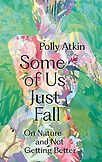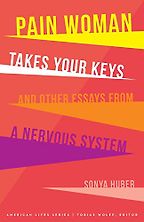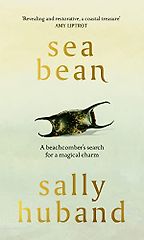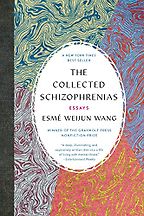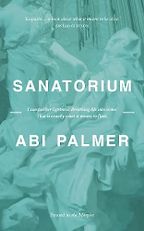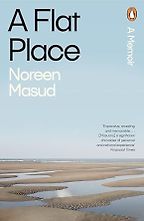Thank you for putting together this list of books about chronic illness. You do so from the perspective of a writer who lives with a long-term condition. Do you find consolation or catharsis in reading about other people’s experiences?
Both of those are interesting words—loaded words, in lots of different ways. There’s definitely a sense of recognition, and that has been very important for me. Early on, both in the process of beginning to write about chronic illness myself, but also in trying to understand my experiences, finding other people who had experienced those same things helped me feel less alone. The experience can be incredibly lonely and isolating, especially when you don’t really know what’s happening with your illness. Just knowing that other people have been through that, and that it is both common and normal, is incredibly comforting. And alarming in other ways.
Yes. To quote Sonya Huber, the author of the first book you’ve chosen to recommend, Pain Woman Takes Your Keys, “the gulf separating the pained from the non-pained can be summed up in one question: ‘Have you tried yoga?’” Would you say that’s a defining aspect of chronic illness—a sense of disconnect, of being misunderstood?
Definitely. There’s another essay in that book where she writes about the “kingdom of the sick” and the “kingdom of the well”, using the terms that Susan Sontag used—in Illness as Metaphor, she wrote of descending into the kingdom of the sick, how it was an entirely different place, something that is very recognisable to a lot of people who are chronically ill.
It certainly chimed with some of my experiences, and helped me understand my whole life. Looking back, I thought I had been living in the kingdom of the well, and had maybe taken a slight detour into the kingdom of the sick. Then I realised I had never been living in the kingdom of the well at all.
“Anybody can become ill—it doesn’t matter who they are, what their background is”
I see them as layered, one on top of the other, two different modes of existence. The gulf between them is huge. Another quote I was drawn to as a teenager was from The Great Gatsby, where F. Scott Fitzgerald wrote that “there was no difference between men… so profound as the difference between the sick and the well.”
Health conditions are so intersectional, you know? Anybody can become ill—it doesn’t matter who they are, what their background is. Obviously how it is managed can vary according to external factors, but essentially there is a kind of gulf, I think, which becomes a gulf in understanding as well. Which is why these writings about chronic illness are so vital and so extraordinary in different ways.
Let’s pause for a moment longer on Sonya Huber’s Pain Woman Takes Your Keys. Could you talk us through why you recommend it?
Yes, Pain Woman Takes My Keys is basically my ur-text when thinking about chronic illness, particularly the writing of chronic illness and chronic pain. Partly because it’s so varied in the way she approaches it. It’s quite fragmented in form, a collection of essays. Some of them you could also think of as poems in some ways. There’s one in there that is an alternative pain scale—with the numbered aspect of a pain scale, but with completely different content to the pain scale you are given in a hospital. The philosophical aspects of Huber’s thinking about what it means to be a body in pain is just exquisite. So relatable and also mind-expanding. It’s a book I always come back to and which I always recommend to people, saying: this will change everything.
Could you tell us about your own recent book, Some of Us Just Fall?
Yes. It’s a mixture of memoir, pathography—illness writing—and nature writing. It tracks my life here in the Lake District, where I’ve lived for the last 16 or so years, which is a place that people often associate with good health, outdoor pursuits, and lots of activity. Living in this place, I was becoming increasingly ill, then began to understand why that is. Parallel to that, it looks at my life history, childhood experiences, and how those eventually led to my diagnosis in my thirties with two genetic conditions that had been making me ill all my life. There’s a kind of rewriting of your past that happens, when you have a new way to understand it.
You mention the crossover between nature writing and writing about chronic illness. The second book you’ve chosen is Sea Bean by Sally Huband. She’s a writer from Scotland’s Shetland Islands.
Sally’s is the first book I can think of—certainly the first recent book, published in the UK—that combines nature writing and thinking about chronic illness. Part of the narrative is about Sally’s development of rheumatoid arthritis after a pregnancy, and how that changes her relationship with the natural world.
Sally and I have been in correspondence for several years, remotely. She sent me a book that has been really important to me in the writing of my own. So it was amazing to see this book, Sea Bean, develop. Through that time, we had been talking about the lack of thought about embodiment – about the realities of living in a body – which is so central to nature writing, or the assumption of a certain kind of embodiment, which I’ve been thinking about for a long time.
And Sally writes about both the landscape of Shetland and her experiences of illness so beautifully. And that aspect of beauty, I think, is really important. So much writing about illness ends up being something quite separate from the rest of our existence. To me, those things can’t be separated. So it’s amazing to see somebody writing about this together.
Your next book recommendation is actually one of my own favourite reads of recent years: Esme Weijun Wang’s The Collected Schizophrenias. She writes about the complexities of mental illness, especially for those whose diagnoses shift over time. I suppose that has some parallels with less understood physical ailments too.
Yes, completely. She also has experience of chronic pain as well. I think not separating the two is quite important, and quite central to some of her writing. This is one of those books that, when I first read it, blew me away. Although in some ways she’s talking about very different conditions to mine, there’s a commonality of experience, particularly in the experience of being a younger woman in the medical system, which is horrific in so many different ways. Although she’s talking about the American system, and also of being a racialised young woman, there are so many points in that text that made me cry in recognition.
She writes so openly, so honestly, and so beautifully. That really helped set me on the course to think about how we can write about these experiences. We can be honest and open. Because it’s a big thing to write about, mental health, which is still so contested. And in that way it’s a really ground-breaking book.
Next you’ve selected Abi Palmer’s Sanatorium. It was shortlisted for the Barbellion Prize in 2020, an award for writing on disability and chronic conditions.
This is a fascinating book in so many different ways. Partly, the subject matter, and partly the way it’s written. It’s about Abi’s experiences of chronic pain and illness. We share a connective tissue disorder, so it’s particularly interesting to me because of that. It’s about seeking a water cure in a lot of different ways, and also about living conditions—not something we hear about often in books about illness, or books in general.
That a lot of the book is about how being in warm water really eases Abi’s pain. But the flat she lives in, in London, doesn’t have a bath. So she buys an inflatable bathtub online to try to manage her pain, but a lot of strange and peculiar things arise out of that bath. The flat is kind of rejecting the bath.
“There’s extraordinary writing out there, and extraordinary writing that is created under great duress”
It begins when she gets funding to go to a very fancy sanatorium to take a water cure. And how she writes about that is very beautiful, very extraordinary, very illuminating. In amongst all that, there is thinking about miraculous cures, saints, rapturous experiences. So there are these different strands that weave together.
I love this book, because it’s a bit like Sonya Huber’s book—and Esme’s as well—in their very form, they capture something of the experience. A kind of strange, dislocating, fragmenting experience of living with illness.
And perhaps there’s an element of this too in your final chronic illness book recommendation, Noreen Masud’s A Flat Place. This is a recent release, and again has aspects of landscape writing. I think she suffers from complex PTSD, is that right?
That’s right. She writes so extraordinarily, so amazingly about that relationship between the body and the mind, an embodied experience of living with complex post-traumatic stress disorder. And the experience of trying to be a body in place, when you feel really disconnected from that body. For her, she finds comfort in flat places, and the book is a kind of journey through different flat landscapes.
I actually found it really hard to read, it was so intensely, powerfully relatable. I had to keep putting it down and picking it back up again. I know I’m not alone in having had that experience. There was almost too much recognition, in that experience of trying to come to terms with one’s own existence. I particularly appreciate how she writes about the problems of trying to make sense of your own past and how to talk about it when it seems inexplicable. She writes with so much nuance about the layering of memory and forgetting, about how landscape holds memory, or refuses it – how ‘landscapes are the sites of so much pain’, but flat landscapes are often seen as empty and that feeds into their exploitation. Most importantly to me, she refuses a narrative of ruin – to landscape or the body. She compares herself to a damaged landscape, but says even if she never ‘recovers’ from that damage, that’s all right – ‘something new has been made’.
It’s also one of very few books I’ve read that deal well with the lockdowns of 2020, and the different kinds of entitlement revealed in people’s various responses to them.
These are all just amazing books. But picking five was really hard. I pinned it down to memoir, so I didn’t get distracted thinking about poetry or fiction, but there is now—in a way I don’t think there was five years ago—an array of extraordinary books about different forms of chronic illness from different positions. Often they are published with small publishers, some are self-published, lots are not well distributed. So they can remain quite niche publications in some ways. But there’s extraordinary writing out there, and extraordinary writing that is created under great duress as well. So it would be great to see more of those books being more widely read.
Where should people look?
The Barbellion Prize list is obviously a great resource. The winner from last year, Letty McHugh’s Book of Hours, was absolutely extraordinary. There was another memoir on the shortlist last year which I really loved, Shahd Alshammari’s Head Above Water: Reflections on Illness, which is unusual in talking about chronic illness and disability in the Arab world—she didn’t find any representation of disabled women in Gulf literature before she started writing her own. But, yes, there are many breaking the mould in some way. I’ve just read Canadian writer and academic Karen Engle’s amazing memoir Chronic Conditions, and looking forward to the publication in October of Moving Mountains, edited by Louise Kenward, which is the first anthology of nature writing by disabled and chronically ill writers published in the UK.
Do you think that by expressing the experience of chronic illness, this might feed into the creation of a more humane medical establishment?
Definitely. I mean, I hope so. Part of what ties these books together is, unfortunately, the experience of being mistreated by the medical establishment in various ways, for various reasons. I hope that nobody could read any one of these books and think that’s okay, and that we should continue to do things the same way. I hope they slowly shift a paradigm, not just about how we treat individual people and individual symptoms, but in how we think about chronic conditions more broadly.
Interview by Cal Flyn, Deputy Editor
August 14, 2023
Five Books aims to keep its book recommendations and interviews up to date. If you are the interviewee and would like to update your choice of books (or even just what you say about them) please email us at [email protected]
Five Books interviews are expensive to produce. If you've enjoyed this interview, please support us by donating a small amount.

